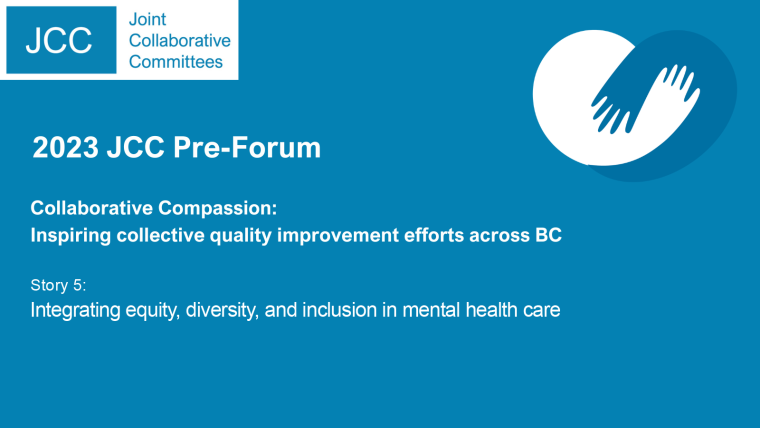- Managing your Practice
-
- Your Benefits
-

Introducing the ultimate Club MD experience
From work to play, and everything in between, we provide you with access to hundreds of deals from recognizable, best-in-class brands, elevating every facet of your life – from practice supports to entertainment, restaurants, electronics, travel, health and wellness, and more. Your Club MD membership ensures that these deals are exclusive to you, eliminating the need to search or negotiate.
Welcome to the ultimate Club MD experience. Your membership, your choices, your journey.
-
- Advocacy & Policy
-
- Collaboration
- News & Events
-

Stay Informed
Stay up to date with important information that impacts the profession and your practice. Doctors of BC provides a range of newsletters that target areas of interest to you.
Subscribe to the President's Letter
Subscribe to Newsletters
-
- About Us
-

Integrating equity, diversity, and inclusion in mental health care
June 5, 2023
JCCs: Collaboration in Action

Cognitive behavioral therapy (CBT) is an effective psychological treatment method that can help with depression, anxiety, substance use issues, and many other mental health concerns. Founded by Dr Joanna Cheek and Dr Erin Burrell, the Cognitive Behavioral Therapy (CBT) Skills Groups Society is a provincial non-profit organization that administers physician-led mental health skills groups across British Columbia. In 2021, the Society received multi-year funding from the Shared Care Committee (SCC) to establish a province-wide program.
As part of its growth in BC, the society, and its partners, which includes the Vancouver Division of Family Practice (VDoFP) and UBC Continuing Professional Development (UBC CPD), identified equity, diversity, and inclusivity (EDI) as a core value in the organization. This work aimed to improve the patient experience for people with marginalized identities.
Anya Phillip, a Black, Queer, and non-binary program coordinator at the VDoFP, explained, “For people with marginalized identities, particularly BIPOC, much of our stress and big emotions come from experiencing discrimination or microaggressions. It can be hard to learn how to manage your mental health, when you don’t see yourself or your experiences reflected or addressed readily in the content.” They added that the team, “saw this thread of wanting to be seen and wanting more diversity in some of our patient feedback survey responses and direct communications with patients”.
The Society conducted many PDSA (Plan, Do, Study, Act) cycles with EDI in mind. This included UBC CPD Facilitator Workshops (on EDI, trauma-informed care, and facilitator skills), EDI-themed facilitator webinars and small group sessions to debrief content, as well as rewriting the facilitator guide and workbook to be more inclusive. The Society also prioritized recruiting a more diverse facilitator group, including improved representation for different languages, genders, sexual orientations, and geographic and cultural groups.
The new additions include educational videos on unconscious bias, an EDI guide for CBT facilitators, facilitator workshops, and 10 CBT handouts, translated into 8 languages—including Tagalog, Persian, and Punjabi. Dr Eleanor Parton, a CBT Skills Groups facilitator family physician from the Wei Wai Kum band of the Kwakwaka'wakw Nation, is leading the creation of CBT handouts for Indigenous patients.
Oshin Maheshwari, a senior psychiatry resident who moved from India to Canada later in life, has been involved in the creation of the webinars, revamping of the facilitator guide, and creating a podcast for facilitators and participants/patients that focuses on psychotherapy and EDI. She is the newly-designated EDI lead of the CBT Skills Groups Society, and also leads groups herself. She is highly motivated to do this work as “witnessing the changes made to the content with an EDI lens allows me to see more of myself in the content, and I hope that others can experience more of themselves in the program.”
According to Christine Tomori, Executive Director of the CBT Skills Groups Society and project lead for the provincial expansion of the CBT Skills Groups, this work has been a learning experience for the entire team, “We all carry our unconscious biases. While doing this work, I have felt uncomfortable and have been gently challenged. I have also gently challenged others. We would not be where we are today had it not been for our patient participants providing us feedback, our partnership with the Vancouver Division, passionate physician leads and staff, and facilitators.”
This summer, the team will use the EDI facilitator’s guide and pilot the revised EDI patient workbook with some patient groups. Anya added that the work is ongoing, and next steps include engaging even more patient consultants, furthering the work around cultural safety, and continuing to foster this culture shift they are seeing, “We can’t do this work without the voices of the people we’re aiming to support and help.”




